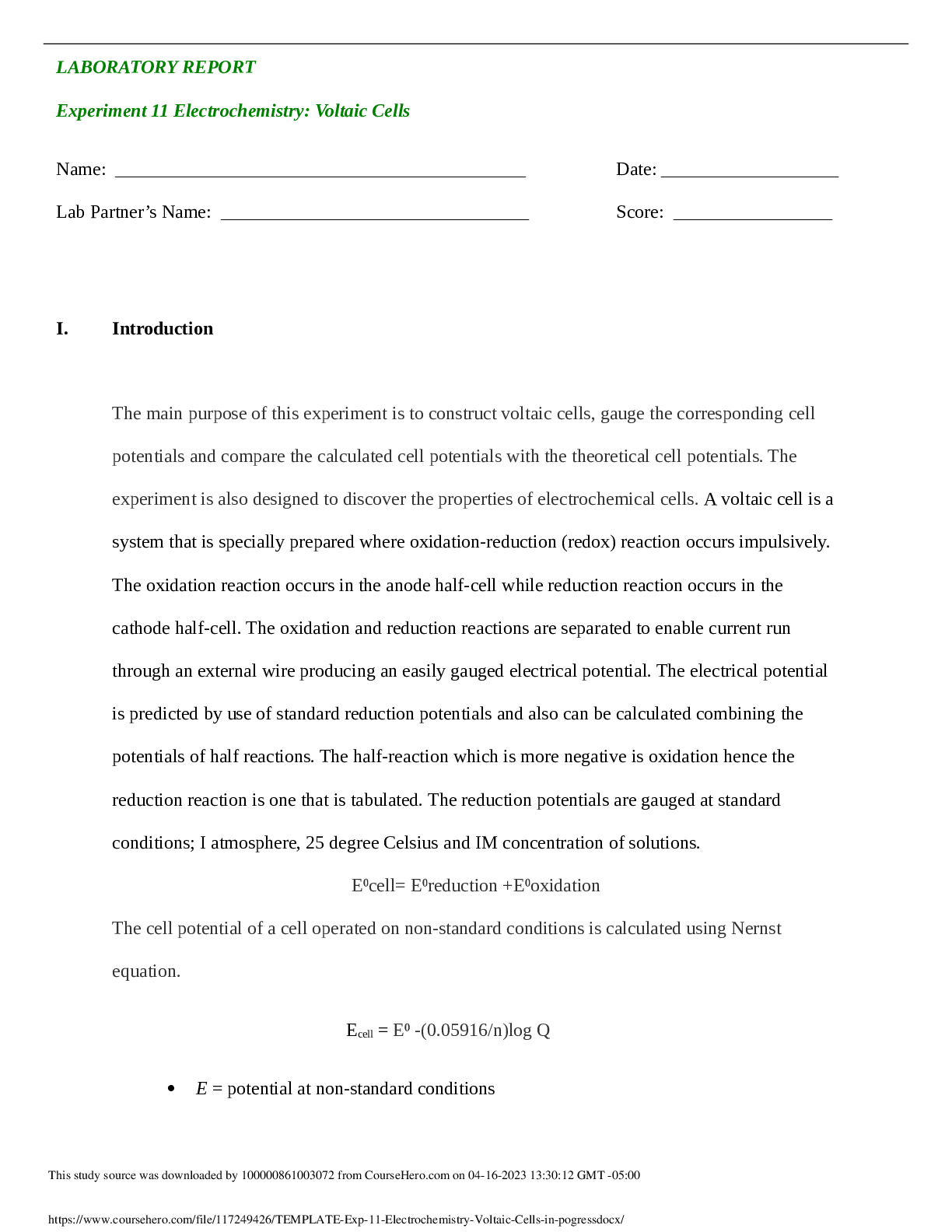Thermodynamics > Experiment > MECHANICS MEE20001 THERMODYNAMICS 1 - LAB 1 Experiment 1. 1st Boyle's Law Experiment 2nd Gay-Lussac (All)
MECHANICS MEE20001 THERMODYNAMICS 1 - LAB 1 Experiment 1. 1st Boyle's Law Experiment 2nd Gay-Lussac Law Experiment 3rd Isentropic Expansion Process
Document Content and Description Below
LAB 1 1. Introduction Thermodynamics is the study of the relations between heat, work, temperature, and energy. The laws of thermodynamics describe how the energy in a system change and whether the... system can perform useful work on its surroundings (Britannica, 2019). The objective of this lab will be on ideal gas also known as perfect gas following the equation PV=nRT , where P is pressure, V is volume, n is number of moles, R is gas constant (8.314410kPa . kmol m3 . K) and T is temperature ( K ) . A perfect gas is defined as a gas with no intermolecular attractive force and particles that only collide in a perfectly elastic manner. The Perfect Gas Expansion Apparatus was used in this experiment to study the characteristics of perfect gas. It is made up of a pressure chamber and a vacuum chamber, with a vacuum pump used to change the pressure within each chamber by adding or withdrawing air via transmission pipes. The behavior of an ideal gas in relation to specific physical properties will be experimented and assessed. In this lab, namely three experiments were carried out, 1st Boyle's Law Experiment 2nd Gay-Lussac Law Experiment 3rd Isentropic Expansion Process 2. Objective 1. Experiment 1 – Boyle’s Law experiment To determine the relationship between pressure and volume of an ideal gas. 2. Experiment 2 – Gay-Lussac Law experiment To determine the relationship between pressure and temperature of an ideal gas. 3. Experiment 3 – Isentropic Expansion Process To demonstrate the isentropic expansion process.3. Theory 1. Boyle's Law Boyle's Law is an experimental gas law that states that the absolute pressure exerted by a given mass of an ideal gas is inversely proportional to the volume it fills if the temperature and quantity of gas stay constant within a closed system. Boyle’s Law can be stated, mathematically as: P∝ 1 V , where P is the pressure of the gas, V is the volume of the gas. This equation can also be written as, PV =k , where k is the constant. According to the equation, the product of pressure and volume is a constant for a given quantity of gas molecule if the temperature remains constant. The equation states that the product of pressure and volume is a constant for a given mass of confined gas and this holds if the temperature is constant. For comparing the same substance under two different sets of conditions, the law can be usefully expressed as: P 1V1=P2V2This equation shows that, as volume increases, the pressure of the gas decreases in proportion. Similarly, as volume decreases, the pressure of the gas increases. 2. Gay-Lussac Law Gay-Lussac Law is a form of the ideal gas law in which gas volume is kept constant. When volume is held constant, pressure of a gas is directly proportional to its temperature. The usual equations for Gay- The connection may be deconstructed using particle kinetic theory. As the temperature of a given gas rises in [Show More]
Last updated: 2 years ago
Preview 1 out of 11 pages

Buy this document to get the full access instantly
Instant Download Access after purchase
Buy NowInstant download
We Accept:

Reviews( 0 )
$9.50
Can't find what you want? Try our AI powered Search
Document information
Connected school, study & course
About the document
Uploaded On
Apr 25, 2023
Number of pages
11
Written in
Additional information
This document has been written for:
Uploaded
Apr 25, 2023
Downloads
0
Views
58




